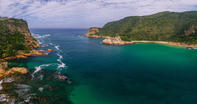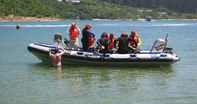Warm and Clear Conditions
The unpredictability of the southern Cape weather and its sea conditions is one of the biggest influences on not only the diving conditions, but also on the dive sites themselves. The natural cycle of storms and huge tidal shifts means that sand is constantly shifting, continually opening up new parts of reefs and wrecks.

The beginning of summer brings strong south easterly winds and lots of rain flushing sediment and nutrients into the estuary and the sea in Knysna. It is not unusual to start the day with 16°C, zero visibility water, changing to 21°C water with 12 metre visibility as the high tide comes in.
As summer progresses, good conditions become more regular with the best diving to be had in Knysna is between January and April. Winter conditions are generally good, albeit colder, with temperatures ranging between 11°C and 18°C – perfect for a 5mm wetsuit and a hoodie!
Diving Spots

Depths of Knysna diving spots range between 12m and 22m, putting most sites within the capabilities of open water divers. There are, however, more difficult and challenging sites for the more advanced divers. Marine life is abundant, ranging from the elusive Knysna seahorse to huge schools of reef fish, game fish, cephalopods and various shark species including raggies.
You will also find colourful hard and soft corals, huge sea fans, basket stars and giant wall sponges. On all sites in the area are various colourful nudibranchs to be found. Warm summer currents also bring tropical fish from the north into the estuary. These fish, unfortunately, die as the temperature of the water drops as winter approaches. Summer water temperatures are 16-23°C and in winter water temperatures are around 14-19°C.
Most sites are easily accessed from the shore or via an exciting boat ride through the famous Knysna Heads. This is only to be attempted by experienced skippers with local knowledge. The wearing of life jackets is compulsory with every launch from the beach. Diving facilities in the area include air and nitrox fills, gear rentals, equipment sales as well as dive training and speciality courses.